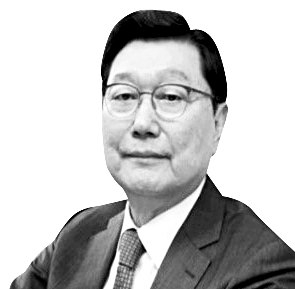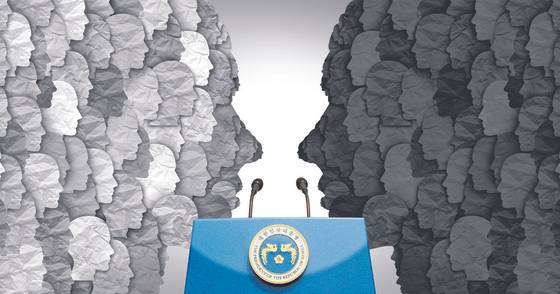Something is rotten
이 글자크기로 변경됩니다.
(예시) 가장 빠른 뉴스가 있고 다양한 정보, 쌍방향 소통이 숨쉬는 다음뉴스를 만나보세요. 다음뉴스는 국내외 주요이슈와 실시간 속보, 문화생활 및 다양한 분야의 뉴스를 입체적으로 전달하고 있습니다.

Chung Duck-koo The author is the chairman of the North East Asia Research Foundation and a former minister of commerce, industry and energy.
With the presidential election less than two months away, the new year presents two fundamental questions to the Korean people. First, why are we not happier after achieving both industrialization and democratization? And second, how we can find the presidential leadership befitting the matured status of our country?
According to the World Happiness Report published by the United Nations Sustainable Development Solutions Network, Korea’s ranking plunged to 61st in 2020 from 41st in 2013. What really happened? An election year only tends to make people more upset due to a dearth of presidential candidates with a vision to lead the country forward.
When the 21st century dawned, Korea had to tackle a plethora of challenges from the 20th century — such as addressing layers of sociopolitical conflict accumulated from its earlier days of fast and furious growth after successfully overcoming the Asian financial crisis of the late 1990s.
But Korea’s political leaders tried to solve all problems based on their ideologies, as seen in their habitual denial of their predecessor’s legacy and trumpeting their own ideology as the new zeitgeist of the times. As a result of heated factional battles, the culture of inheriting political values and seeking co-governance vanished completely. Political leaders’ inability to resolve them only helped widen internal schisms.
The adverse effects of twisted political systems reinforced the people’s distrust in politics, provoked public cynicism about politicians, and deepened concerns about the future. That made a majority of Koreans feel unhappy despite marvelous economic achievements. After such pathological deviations were left unattended for a long period of time, it accelerated the deterioration of our political ecosystem.
In an ecosystem crammed with political pigmies, ideology-based groups of politicians and professionals — including so-called “polifessors” — have emerged in a new administration every five years after helping their favored candidates win presidential elections. The group domineered national governance at the risk of uprooting the existing governance structure, which helped the nation fragment further and lowered the productivity of the political ecosystem.
In the meantime, people with vision and ideals shunned politics or were pushed to the sidelines. In the process, politicians pursued their survival — not noble values — and became synonymous with plain salarymen. As their words and actions increasingly betrayed the public’s expectations — and after that image was consolidated — they helped ruin the habitat for public offices and policies.

After a politician volunteers to run for president — saying “Why not me?” — members of the same party heartily embraced such candidates after turning a blind eye to their genuine qualifications as head of state. To make their candidate look bigger, they gave him or her a ride on their shoulders. But after an election victory, the scrums turned into shackles for the president.
If a selfish and small-minded politician becomes a president — and if the president is given too much power — it only facilitates the demise of the presidency. After such a process was repeated over and over, our five-year single-term presidency was doomed.
It is very difficult for political parties to breed a leader in such barren habitats. When the world is headed into unprecedented chaos and confusion, could Korea maintain its sovereignty and survival in such a degraded habitat?
The remaining 50 days before the March 9 election in Korea carry great significance for presidential candidates. I hope they draw up farsighted blueprints to rebuild the country starting with accepting the limits of power instead of following in the path of failed past presidents. The time has come for them to overhaul the sclerotic ecosystem to a new level of cooperation and harmony with the opposition after putting diehard ideology-based approaches behind them.
Policy-level cooperation with other candidates ahead of the presidential election also could be a solution. I look forward to seeing the arrival of a new political ecosystem that can institutionalize co-governance if someone is elected president. That is the real zeitgeist of our times. Translation by the Korea JoongAng Daily staff.
Copyright © 코리아중앙데일리. 무단전재 및 재배포 금지.
- 'Single's Inferno' contestant admits to wearing fake designer clothing on show
- A star is born in Daejeon as Korea leads in the fusion race
- North says Monday's missiles are in production
- BTS's Jimin sells out his new merch drop within seconds
- BTS's V's 'Virkin' bag sells out in seconds leaving many ARMY disappointed
- Rookie girl group Kep1er ranks on Spotify and Billboard charts
- First Paxlovid prescriptions prove successful overall
- President Moon confirmed safe after drone strike in UAE
- Former T-Ara member Soyeon to marry Suwon FC's Cho Yu-min
- In a case of living vs. deceased, who will get the best view?